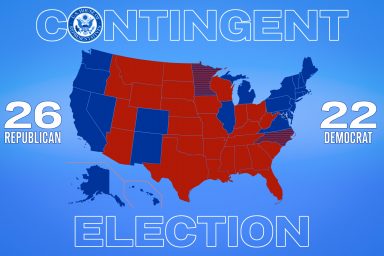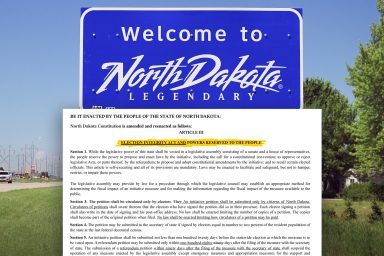Dominion Voting Systems has earned a controversial reputation in recent years. Trump is attempting to use that to his advantage as he refuses to concede.
|
Listen To This Story
|
Refusing to publicly accept defeat, President Donald Trump repeated a debunked right-wing conspiracy theory on Twitter in recent days, claiming millions of votes were potentially altered by a top voting machine manufacturer.
Dominion Voting Systems categorically denied that more than two million votes were deleted and hundreds of thousands switched for President-elect Joe Biden. Trump’s claim originated from a report from One America News Network (OANN), a far-right and unapologetically pro-Trump cable channel.
Dominion’s denial did not stop this theory from reaching the airwaves of Fox News, where Sean Hannity echoed that Dominion’s machines flipped votes in states like Michigan and Arizona. There is no proof of anything like this occurring.
Dominion, like its competitors, sells ballot-marking devices (BMDs), about which election experts have raised cybersecurity concerns in recent years. As described in WhoWhatWhy’s latest e-book, Is This Any Way to Vote?: Vulnerable Voting Machines and the Mysterious Industry Behind Them, the main concern is that votes cast with BMDs cannot be audited because election workers must rely on a QR code containing a voter’s choices instead of the human-readable text listed below it on the ballot.

Election workers running ballots through a Dominion Optech 400-C high-capacity ballot scanner in San Francisco, CA. Photo credit: FGovTV / YouTube Creative Commons Attribution license (reuse allowed)
In Georgia, where Biden won by more than 15,000 votes, the state’s top election official came under fire for spending $100 million on a contract with Dominion that included these machines. In 2018, Gov. Brian Kemp (R) — who was secretary of state at the time — refused to make documents for the certification process public for nearly a year. After he did, the documents did not include the name of the person who allegedly oversaw the state certification process for the new equipment.
Another concern about BMDs is that most of the machines in use today are nearly a decade old. Like any piece of technology, these machines can malfunction or become more vulnerable to manipulation as they age. During his tirade against Dominion, Hannity cited as an example a New York Times article that reported several instances in which voting machines failed to power on. Again, there is no evidence that any votes were changed during the 2020 election, through technological failure, hacking, or any other means.
Nevertheless, Trump continued his diatribe against Dominion on Sunday, claiming in a tweet that votes were “tabulated by a Radical Left privately owned company, Dominion, with a bad reputation & bum equipment.”
This claim originated from that same OANN report that said Dominion was owned and operated by high-profile Democrats. Dominion is a privately-run company and not required to disclose financial reports. It is, however, required to disclose its lobbying practices. Since 2018, Dominion has retained Brownstein Hyatt Farber Schreck to lobby on its behalf, according to Open Secrets. The firm’s employees have donated to Democratic and Republican lawmakers.
Dominion has long operated with little accountability. In Georgia, US District Judge Amy Totenberg heavily criticized election officials and Dominion after the intelligence community classified election equipment as critical national infrastructure just weeks before the November 3 election — and emphasized her point by quoting the 1983 film Groundhog Day.
“Weatherman Phil Connors is doomed to repeat the same day over and over again: ‘I wake up every day, right here, right in Punxsutawney, and it’s always February 2nd, and there’s nothing I can do about it,’” Totenberg wrote. “The Court can relate; it feels like it’s February 2nd in Punxsutawney.”
Totenberg allowed the machines to be used in the 2020 primaries and general election, with the understanding that the machines would then be subjected to a thorough investigation and examination from the state and independent cybersecurity experts in the future.
—
For more of WhoWhatWhy’s work on Protecting Our Vote, see our Student Voter Guide and our series America Decides 2020. You can also find out the darker secrets behind our voting systems in our recently published e-book Is This Any Way to Vote?: Vulnerable Voting Machines and the Mysterious Industry Behind Them by Celeste Katz Marston and Gabriella Novello, available on Amazon now.
Have a tip for our election integrity news desk about voting issues? Send us an email here: Election Integrity Desk.
Related front page panorama photo credit: Adapted by WhoWhatWhy from FGovTV / YouTube Creative Commons Attribution license (reuse allowed).




